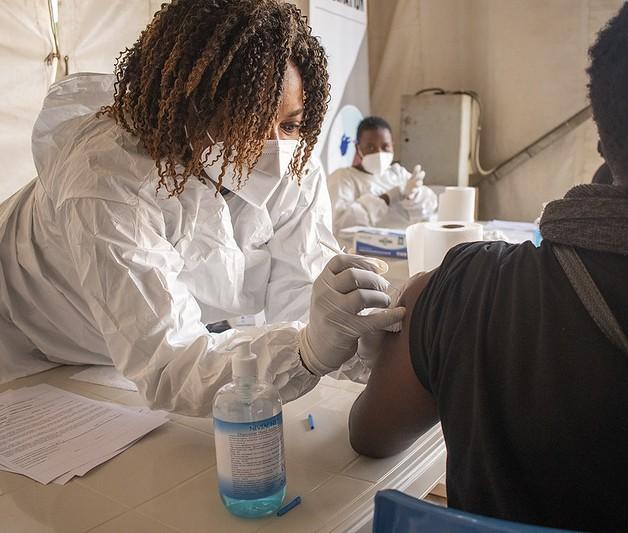mRNA COVID-19 vaccines are highly effective in preventing adult hospitalizations from the Alpha, Delta, and Omicron SARS-CoV-2 variants, but three doses are needed to reach the same efficacy against Omicron as two doses offer against the first two strains, suggests an observational test-negative study yesterday in BMJ.
A team led by University of Michigan at Ann Arbor and Centers for Disease Control and Prevention (CDC) researchers prospectively estimated the effectiveness of the Pfizer/BioNTech and Moderna vaccines against COVID-19 hospitalization among 5,728 adult COVID-19 patients and 5,962 uninfected controls at 21 US hospitals.
Consistent with increasing vaccine uptake in the United States over time, a greater share of patients had received two or three doses of an mRNA vaccine during the Omicron period (52.1%) than in periods in which Alpha (11.1%) and Delta (27.3%) were predominant.
To identify the causative strain, the researchers used whole-genome sequencing or the predominant circulating variant at hospital admission (Alpha, Mar 11 to Jul 3, 2021; Delta, Jul 4 to Dec 25, 2021; and Omicron, Dec 26, 2021, to Jan 14, 2022).
Whole-genome sequencing was obtained for 45.4% of cases. Among them, Alpha was identified in 57.5% of cases in the Alpha period, Delta in 96.7% in the Delta period, and Omicron in 76.6% in the Omicron period.
3 doses 86% effective against Omicron hospitalization
Estimated vaccine effectiveness (VE) against COVID-19 hospitalization was 85% (95% confidence interval [CI], 82% to 88%) for two doses against Alpha, 85% (95% CI, 83% to 87%) for two doses against Delta, 94% (95% CI, 92% to 95%) for three doses against Delta, 65% (95% CI, 51% to 75%) for two doses against Omicron, and 86% (95% CI, 77% to 91%) for three doses against Omicron.
Within each period, estimated VE was lower for immunocompromised patients than for those with intact immune systems and lower with the Pfizer vaccine than for Moderna.
The in-hospital death rate was 7.6% among Alpha patients, 12.2% for Delta, and 7.1% for Omicron. Unvaccinated hospitalized COVID-19 patients had more severe illness on the World Health Organization's clinical progression scale with Delta than with Alpha (adjusted proportional odds ratio [OR], 1.28; 95% CI, 1.11 to 1.46) and lower with Omicron versus Delta (OR, 0.61; 95% CI, 0.49 to 0.77).
Relative to unvaccinated patients, the vaccinated had less severe disease for each variant, with an adjusted proportional OR for Alpha of 0.33 (95% CI, 0.23 to 0.49), 0.44 for Delta (95% CI, 0.37 to 0.51), and 0.61 for Omicron (0.44 to 0.85).
Of vaccinated and unvaccinated patients hospitalized with Omicron cases, 15% needed invasive mechanical ventilation. Estimated VE of two or three doses against progression to invasive mechanical ventilation or death was 76% (95% CI, 53% to 88%) for Alpha, 44% (95% CI, 32% to 54%) for Delta, and 46% (95% CI, 12% to 67%) for Omicron.
Among both vaccinated and unvaccinated patients, 11.7% died within 28 days, including 7.6% in the Alpha group, 12.2% in the Delta group, and 7.1% in the Omicron group.
Compared with Alpha and Delta, Omicron patients tended to be older, have more underlying medical conditions, and be more likely to have been hospitalized at least once in the past year.
New vaccine formulations may be needed
The authors said that, despite the potential misclassification of variants and possible differences in clinical management during the different variant periods, the study's results were robust.
"Although disease severity for in-hospital patients was somewhat lower for the omicron variant than alpha and delta variants, patients admitted to hospital with covid-19 due to the omicron variant still had a substantial risk of critical illness and death," they wrote. "These findings suggest that vaccination against covid-19, including a third dose of an mRNA vaccine, is critical for protecting populations against covid-19-associated morbidity and mortality."
The researchers said that understanding COVID-19 severity and VE with each variant is critical for guiding vaccination policies and future vaccine development.
"Substantial viral immune evasion would require new vaccine formulations targeting new variants to maintain protection," they wrote. "As the covid-19 pandemic continues to evolve, routine monitoring of vaccine effectiveness, especially against severe disease, and surveillance programmes to identify viral variants will be essential to inform decisions about booster vaccine policies and vaccine strain updates."






















